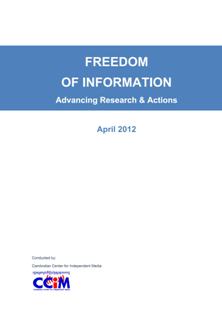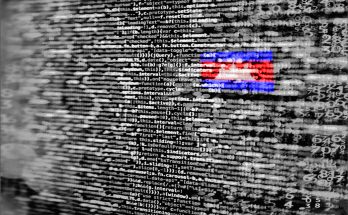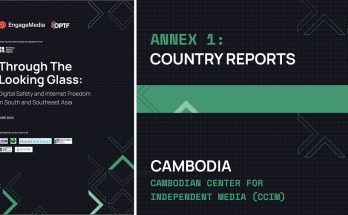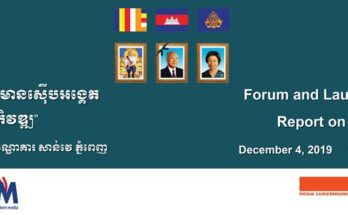RESEARCH SUMMARY
Access to information is a fundamental human right and one that is pivotal to the development of Cambodia. The 1993 Cambodian Constitution emphasized the obligation of the government to promote and protect the rights of Cambodian citizens. This right of access to information is further enshrined and expanded upon in the Universal Declaration on Human Rights (UDHR) and the International Covenants of Civil and Political Rights (ICCPR), whose article 19 assures the right of everyone to seek, receive, and impart information and ideas through any media.
Almost 20 years after the adoption of the Cambodian Constitution, free access to information in Cambodia is not yet achieved. There is currently an absence of laws and mechanisms to guarantee such a freedom. There is also the lack of knowledge and participation by the public on the issue. Since early 2000, a number of NGOs and advocates have made a push to improve freedom of information, but the commitment of the government and other policy makers has yet to be made.
This brief provides information gleaned from a research study commissioned by the Cambodia Centre for Independent Media (CCIM) and Freedom House. The purpose of the study was to measure the Cambodian public’s opinions on the Access to Information Draft Policy and then obtain feedback from key stakeholders on those opinions.
The data were collected using qualitative and quantitative methods including interviews with 30 key informants, six focus group discussions, and a quantitative survey (with a sample size of 1522). The study was conducted between October 2011 and January 2012.
KEY FINDINGS
- More than 80% of respondents agreed they had the right to access public information. These respondents noted they should have access to information such as national budgets, national expenditures, as well as salaries of public employees.
- More than 80% of respondents agreed that government and public bodies, including elected bodies, should be obliged to provide public information by publishing such information.
- 19.1% of respondents reported having sought information about national statistics, commune budgets and expenditures, and the cost of civil registration. Of those who have sought such information, 32.5% faced difficulty in seeking such information. At the same time, 82% of respondents said information is important to them.
- Almost all respondents tended to be confused between the concept of public information and general news as the majority (98%) reported they had access to public information and they do this mostly by radio (79%), followed by television (78%), and word of mouth (50%)
IMPLICATIONS
Public information, and the right to access such information, should be well defined and guaranteed by law. The legal frameworks for those guarantees should be developed with the broad involvement of civil society and the general public at the community, sub-national and national levels.
Almost all respondents reported a need for a Freedom of Information law. Civil society together with development partners should jointly advocate to the Royal Government of Cambodia to finalize the draft of Freedom of Information law and urge the Houses of representatives to adopt it. Civil society organizations and relevant stakeholders should advocate for the adoption of the Freedom of Information law.
Local democratic spaces such as Commune Committee for Women and Children, Health Centre Management Committee, Commune Committee for Education for All, Commune Committee for Commune and Village Safety, Commune Committee for Disasters, etc. should be strengthened technically and financially to increase access to information at the grassroots, community level.
The government should promote the meaningful involvement of civil society and the general public in municipal/provincial, district/Khan, and commune /Sangkat councils meetings as indicated in the Law of Commune and Sangkat Administrative Management and the Law of Administrative Management of the Municipal / Provincial and District / Khan.
Mechanisms and tools to access to public information, such as means and procedures for accessing to public information, should be developed with meaningful involvement of relevant stakeholders.
There is a need to develop clear mechanism for the public to access information. These mechanisms should be created with the involvement of a variety of stakeholder to ensure buy-in, utility, and usefulness.
Further research on freedom of information and freedom of expression should be conducted within Cambodia. Moreover, the Cambodian Ministry of Planning should consider including questions related to freedom of expression and access to information in future global surveys.
Development partners and civil society institutions should mobilize funds and resources to further study the general public’s opinions about access to information and freedom of expression. The Ministry of Planning could include questions related to freedom of information into its national survey as a way to monitor progress.
Nevertheless, findings from this study should be disseminated and discussed among relevant government and civil society stakeholders as a way to develop future research agendas.
Ongoing discussions about freedom of information and public information should be engaged at various levels of society
Media outlets such as radio, television, websites as well as face-to-face interactions should be considered as potential and effective means to continue the discussion about freedom of information. Further, politicians should use these lines of discussions to engage the general population.
CONCLUSION
Cambodian citizens cannot play an active role in the society for they cannot be properly informed about it. However, governmental accountability and transparency are crucial to Cambodian citizens. Most of them are thirsty for access to public data and believe it is a fundamental obligation of the government to deliver it. Only a fair Freedom of Information law, built in consultation with them and civil society organizations, would enable sustainable mechanisms to be established to pressure the government to respect the fundamental right of Cambodian citizens to “seek, receive, and impart information and ideas”. By legally have the possibility to hold their government accountable for its action, such a law will empower Cambodian citizens to actively build the future of their country and better advocate for their rights.
Click HERE to download the FOI Survey.
FOR MORE INFORMATION
For more information about the study and the Cambodian Center for Independent Media please visit us online at http://www.ccimcambodia.org/ or contact CCIM’s director, Mr. Pa NguonTeang at pnteang@vodhotnews.comor at 012 598 066.




